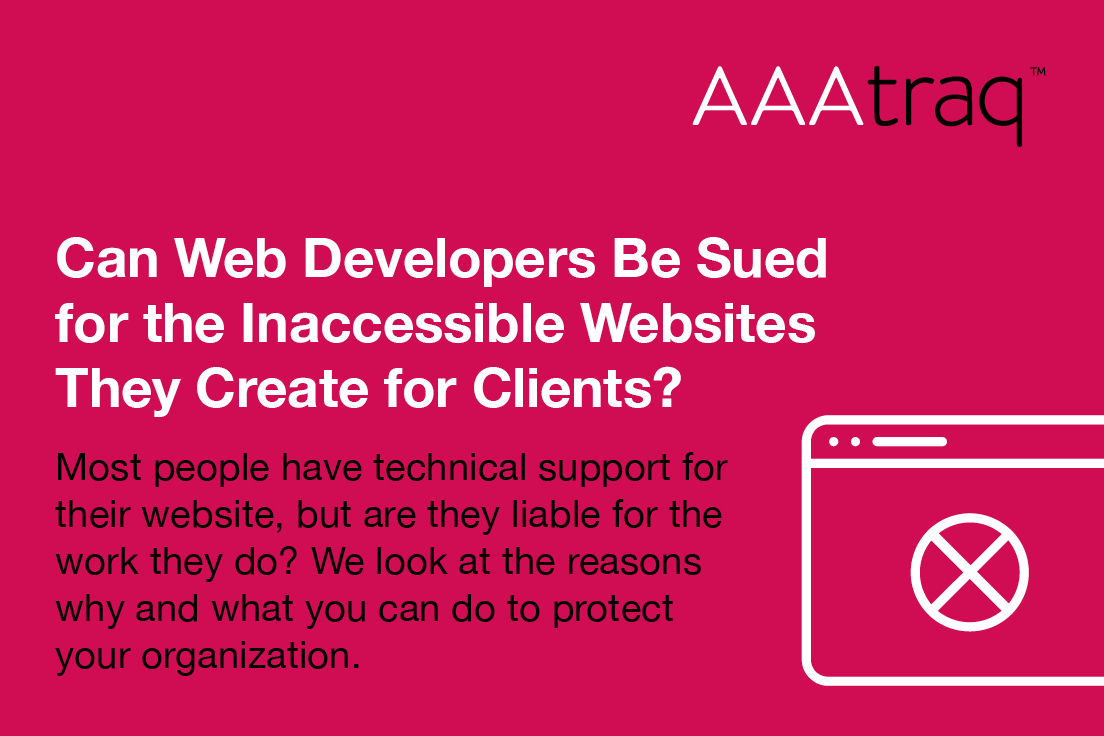Can Web Developers Be Sued for the Inaccessible Websites They Create for Clients?
Jul 28 2022
Web developers are individuals/entities that create and maintain websites.1 Often contracted by 3rd parties (in this case your company being the client), web developers are responsible for creating, maintaining (in many cases), and testing the websites they service. Web developers can be sued for the inaccessible websites they create; however, the manner and rationale for said suit is a bit trickier to understand.
The reason for this predicament stems from a lack of universal clarity that exists in web accessibility law at large. It should be noted that contractors/suppliers/developers are liable for any measure/clause they agreed to in the entrance of a contract with their client. As such, suppliers’ failure to develop accessible websites, depending on the language of the contract that exists between them and their client, may be liable for breach of contract, and therefore subject to litigious action brought forth by the aggrieved party (their client). As for liability in the context of a potential suit by an individual of the public, the answer remains quite unclear and open to argument amongst the legal community. The article below will explore this question through several of the avenues by which a developer might be subject to suit for the inaccessible websites that they create.
The Americans with Disabilities Act (ADA)
Title III of the Americans with Disabilities Act of 1990 (ADA) clearly indicates that liability for inaccessibility in places of public accommodation falls upon the entities that owns, operates, and/or leases them (to).2 The statutory language of Title III of the ADA clearly distinguishes between those who are in possession of the public accommodation (own/operate/lease) and those who are otherwise involved in their existence. Competing jurisdictional analysis of Title III began casting a murkiness over the idea that Title III of the ADA may apply to the internet/websites.3 Still, the text of Title III precludes litigious action directly by users against developers should they not be directly involved in the ownership, operation, and/or leasing of said website.
While Title III may preclude users from directly suing web developers for the operation of the inaccessible web content they create, specific interpretations of Section 303 of the ADA allow for a loophole under which developers may be sued as “architects” of the website.4 The word may is the operative word in this statement, as Courts differ on the application of Section 303 to places of public accommodation that are not explicitly mentioned in the text of the law. Section 303 states that architects may be liable for “a failure to design and construct facilities… that are readily accessible to and usable by individuals with disabilities.”5 The application of Section 303 is easily perceived for the physical environment and should be translated into the virtual environment. For example: A business opening a new location knows that it must put in a wheelchair ramp to be accessible to individuals with a mobility impairment. They contract a construction company to build said ramp and make a full faithed effort to fulfill their obligations to comply with the ADA. In building the ramp the construction company builds a ramp that is unstable, resulting in one user falling through said ramp and injuring themselves. The company is then liable for inaccessibility and damages resulting from the barriers created. Shouldn’t the same principles translate to the virtual environment?
Contractual Language and Obligations
Most developers are liable for litigious action due the contractual relationships in which they enter with their clients. Clients: one of the most important things you can do in establishing your business is the adoption of a well-crafted agreement with your suppliers indemnifying you against the work they do. Developers are liable for the work they produce for their client. They must meet the obligations outlined in the contractual agreement and their work must fulfill the conditions under which it was agreed. Any breach of contract, whether it be mistakes, oversights, or failures to meet expectations, is grounds for litigious action and can result in a significant cost to the developer. It’s to the benefit of the client to seek counsel that will help them enter into the best agreement for their company. A company should seek indemnification clauses, work standards clauses, and outline the mechanisms by which inaccessible content is to be corrected in their contracts. To protect your company, ensure that your website meets accessibility standards, whilst also protecting yourself from the work product of your contractors.
1 “Web Developers and Digital Designers : Occupational Outlook Handbook,” U.S. Bureau of Labor Statistics (U.S. Bureau of Labor Statistics, September 8, 2021), https://www.bls.gov/ooh/computer-and-information-technology/web-developers.htm#tab-2 (opens in a new window).
2 Americans With Disabilities Act of 1990. 42 U.S.C. § 12182. Public Law 101-336. Note: The definition of “public accommodation” is subject to jurisdictional interpretation and thus is a rather fluid concept in the United States. The application of Title III to the internet/webpages varies in degree and manner based upon the jurisdiction (United States Circuit Court of Appeals) in which a violation occurs.
3 The First, Second, and Seventh Circuits have decided that the internet is a place of public accommodation under the ADA, regardless of some nexus to a physical location. The Third, Sixth, Ninth, and Eleventh Circuits have issued rulings wherein they state that the inclusion of the internet as a place for public accommodation is not per se de facto and that there must be some nexus between a physical location and the web content for there to be a claim of inaccessibility.
4 42 U.S. Code § 12183(a).
5 Ken Nakata, “Can Web Developers Be Sued for the Inaccessible Sites They Create for Clients?,” Converge Accessibility, March 5, 2022, https://convergeaccessibility.com/2021/10/25/can-web-developers-be-sued-for-the-inaccessible-sites-they-create-for-clients/#:~:text=%C2%A7%2012182.,the%20ADA%20for%20those%20websites (opens in a new window).
Subscribe to AAAtraq and enjoy complete cover and peace of mind
